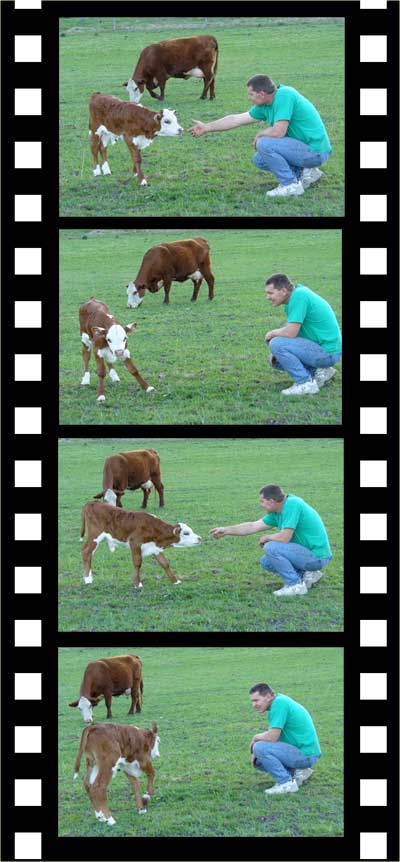Immunoglobulins (Antibodies)
What are Immunoglobulins?
Immunoglobulins are a protective bioactive antibody family found in whey. Whey protein contains about 10-15% immunoglobulins or antibodies (Marshall 2004).
Antibiotics are an important component of milk. Babies, both human and animal, have a developing immune system when they are born. Immunoglobulins in the mother's milk protect babies against disease while they build their own immunity. This process is known as 'passive maternal immunity'. 
Pictures: A curious calf checks out an interesting stranger in the pasture. His mother, Miranda, grazes peacefully in the background. She provides him with all the antibodies he needs to stay healthy through her milk.
Adults make their own immunoglobulins and consume them in foods like whey. Common dairy immunoglobulins include IgG, IgA and IgM. When consumed in food, immunoglobulins bind bacteria, toxins and other harmful molecules and carry them safely out of the body. The immunoglobulins in dairy products have been shown to provide disease protection for humans (Hurley and Theil 2011).
IgM, IgA and IgG are Whey Immunoglobulins
IgM is in the first line of immune system defense. These large antibodies have low specificity so they can attack many types of intruders. IgM antibodies are released when an organism is exposed to an antigen (infection) for the first time. These 'first responders' also convince other immune cells to attack dangerous microbes.
IgA antibiotics are common in mucosal areas such as the nose, lungs, eyes and ears. They prevent mucosal infections by causing microbes to clump or agglutinate. In the intestine, IgA is an immunosuppressant that inhibits proinflammatory responses to oral antigens (Brandtzaeg and Johansen 2007).
IgG is the primary immunoglobulin class present in cow's milk and whey. This is also the most common type of human antibody and makes up about 75-80% of the antibody population. Once in the intestine, IgG antibiotics inactivate harmful infectious organisms by binding to them (Lilius and Marnila 2001). This reduces or eliminates microbes' ability to cause illness. Adding IgG to infant formulas has been shown to reduce microbial and viral infections (Li et al. 2006).
Interesting fact: Milk immunity studies helped develop the basic principals of modern immunology. In 1982, German scientist Paul Ehrlich reported that mice who were immunized against the plant toxins ricin and abrin passed their immunity to their offspring through milk. Later the immunity was shown to be passed through a substance named an antibiotic.
What happens if you don't make enough immunoglobulins?
Selective immunoglobulin M (SIgM) deficiency occurs when people don't make enough IgM. People with SIgM can be extremely susceptible to viruses, bacteria and fungus. Some people with this disorder, usually babies and small children, develop dangerous infections that can be life threatening. They also have a tendency to develop autoimmune disorders. Treatment consists of immunoglobulin therapy (Louis and Gapta 2013). Individuals with SIgM are given immunoglobulin extracted from the blood serum of healthy individuals at regular intervals to replenish their IgM.
References
Brandtzaeg P, Johansen FE. IgA and intestinal homeostasis. In Mucosal Immune Defense: Immunoglobulin A; Kaetzel CS, Ed; Springer: New York, NY, USA, 2007;221–268. Researchgate. Hurley WL, Theil PK. Perspectives on Immunoglobulins in Colostrum and Milk. Nutrients 2011;3:442-474; Pubmed. doi: 10.3390/nu3040442 (full text)
Lilius EM, Marnila P. The role of colostral antibiotics in prevention of microbial infections. Curr Opin Infect Dis. 2001;14:295. Pubmed. Li S-Q, Zhang HQ, Balasubramaniam VM, Lee Y-Z, Bomser JA, Schwartz SJ, Dunne CP. Comparison of effects of high-pressure processing and heat treatment on immunoactivity of bovine milk immunoglobulin G in enriched soymilk under equivalent microbial inactivation levels. J Agric Food Chem 2006;54:739. Pubmed. Louis AG, Gupta S. Primary Selective IgM Deficiency: An Ignored Immunodeficiency. Clin Rev Allergy Immunol. 2013 Jun 12. Pubmed. Kulczycki A Jr, MacDermott RP. Bovine IgG and human immune responses: Con A-induced mitogenesis of human mononuclear cells is suppressed by bovine IgG. Int Arch Allergy Appl Immunol 1985;77:255-258. Pubmed. Marshall K. 2004. Therapetic applications of whey. Altern Med Rev 2004;9:136-156. Pubmed. Full text.
